|
|
|
Sort Order |
|
|
|
Items / Page
|
|
|
|
|
|
|
| Srl | Item |
| 1 |
ID:
100768
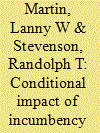

|
|
|
|
|
| Publication |
2010.
|
| Summary/Abstract |
Previous research on coalition politics has found an "incumbency advantage" in government formation, but it has provided no clear explanation as to why this advantage exists. We classify existing theories as either preference-based or institutions-based explanations for why incumbent coalitions might be likely to form again, and we integrate these explanations into a coherent theoretical argument. We also claim that it is possible, to some extent, to distinguish these explanations empirically by taking into account the "historical context" of coalition bargaining. Using a comprehensive new data set on coalition bargaining in Europe, we show that coalitions, in general, are more likely to form if the parties comprising them have worked together in the recent past, and that incumbent coalitions are more likely to re-form if partners have not experienced a severe public conflict while in office together or suffered a recent setback at the polls. The incumbency advantage disappears completely if partners have become mired in conflict or have lost legislative seats (even after accounting for the impact of seat share on coalition size). Moreover, in certain circumstances, institutional rules that grant incumbents an advantage in coalition bargaining greatly enhance their ability to remain in office.
|
|
|
|
|
|
|
|
|
|
|
|
|
|
|
|
| 2 |
ID:
155410
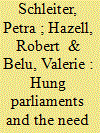

|
|
|
|
|
| Summary/Abstract |
The general elections of 2017 and 2010 produced hung parliaments in which no single party could command an overall majority; in May 2015 the UK only narrowly avoided that outcome. When a parliament is hung, more than one potential government can be viable, and the constitutional rules that determine who has the first right to form the government can thus have a decisive influence on which government forms. In the past, the UK has applied several potentially contradictory rules (based on conventions and principles), which do not all follow an equally democratic logic. This status quo is problematic because it can generate political controversy and uncertainty, in addition to jeopardising the Monarch's role in the government formation process. A reform that enables parliament to elect the leader who will be tasked with the formation of the next government would resolve these problems and provide constitutional clarity.
|
|
|
|
|
|
|
|
|
|
|
|
|
|
|
|
| 3 |
ID:
121638
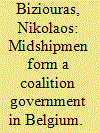

|
|
|
|
|
| Publication |
2013.
|
| Summary/Abstract |
Using a role-playing simulation on government formation with pre- and posttest assessment format, I show that students developed a significantly greater capacity for precision and specificity in their answers about the process of coalition government formation in parliamentary systems; students changed their beliefs in the ability of institutional rules to causally affect the process of coalition government formation in parliamentary systems; and, finally, students, changed their views on whether office-seeking politicians are more successful than policy-seeking politicians in forming coalition governments in parliamentary systems.
|
|
|
|
|
|
|
|
|
|
|
|
|
|
|
|
| 4 |
ID:
146057
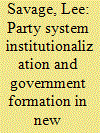

|
|
|
|
|
| Summary/Abstract |
Party systems provide the essential structure of the coalition bargaining environment. Stability in party systems ensures the presence of regularities that can be observed in government formation, but most empirical research focuses on established democracies. In new democracies, party systems are less institutionalized, which means that interactions between parties can be unpredictable and has significant implications for coalition formation. This article presents the first study of coalition formation in new democracies that employs an empirical design comparable to that of the leading research on Western Europe. The author uses a new data set of potential coalitions in Central and Eastern Europe to examine three explanations for government formation that arise when party systems are weakly institutionalized. The results show first that incumbency is a disadvantage for governments in new democracies when formation occurs postelection. This disadvantage is due to high levels of electoral volatility caused by policy failure and clientelistic practices. Incumbents are advantaged when formation takes place midterm, as weak party system institutionalization leads to an inchoate pattern of interaction between opposition parties, which therefore fail to provide a viable alternative. Second, the presence of former dominant parties influences government formation by stifling the development of programmatic competition. Instead, programmatic competition is subjugated to contestation based on historical enmities. And third, established parties collude to exclude new parties from coalition formation—a possible indicator that a party system is becoming more institutionalized. The article provides new insights into the importance of routinized and stable political practices and institutions.
|
|
|
|
|
|
|
|
|
|
|
|
|
|
|
|
| 5 |
ID:
105874
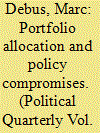

|
|
|
|
|
| Publication |
2011.
|
| Summary/Abstract |
The question of 'who gets what?' is one of the most interesting issues in coalition politics. Research on portfolio allocation has thus far produced some clear-cut empirical findings: coalition parties receive ministerial posts in close proportion to the number of parliamentary seats they win. This article poses two simple questions: Why did the Conservatives and Liberal Democrats agree to form a coalition government and, secondly, did the process of portfolio allocation in the United Kingdom in 2010 reflect standard patterns of cabinet composition in modern democracies? In order to answer these questions, a content analysis of election manifestos is applied in this article in order to estimate the policy positions of the parties represented in the House of Commons. The results show that a coalition between the Tories and Lib Dems was indeed the optimal solution in the British coalition game in 2010. When applying the portfolio allocation model, it turns out that the Conservatives fulfilled the criteria of a 'strong party', implying that the Tories occupied the key position in the coalition game. On account of this pivotal role, they were ultimately able to capture the most important ministries in the new coalition government.
|
|
|
|
|
|
|
|
|
|
|
|
|
|
|
|
|
|
|
|
|